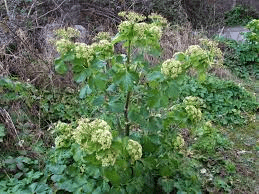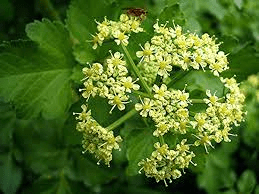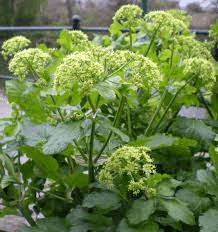Alexanders (Smyrnium olusatrum) is a biennial or perennial herbaceous plant with a long history of culinary and medicinal use. Native to the Mediterranean region, it has naturalized in various parts of Europe and North America. Also known as black lovage, horse parsley, or alisanders, this plant belongs to the Apiaceae family, which includes celery and parsley.
The plant has distinctive dark green, shiny leaves and produces small yellow flowers in umbrella-like clusters. Historically, Alexanders was cultivated and consumed as a vegetable in ancient Rome before the introduction of celery. Today, it is considered a wild edible and is sometimes foraged for culinary purposes.
In terms of culinary use, Alexanders has a flavor profile reminiscent of celery and parsley, with a slightly peppery and aromatic quality. The leaves, stems, and young shoots can be used in salads, soups, or as a seasoning. The plant’s seeds are also edible and have been used as a spice.
In addition to its culinary applications, Alexanders has been used in traditional medicine. Some historical records suggest its use for various ailments, including digestive issues and respiratory conditions, but scientific research on its medicinal properties is limited.
As with any wild plant, caution is advised when foraging, as misidentification can lead to unintentional consumption of toxic plants. It’s recommended to consult with experienced foragers or botanists and use reliable field guides when harvesting wild plants like Alexanders.
The Botanical Description of Alexanders
1. Life Form: Alexanders, scientifically known as Smyrnium olusatrum, is a biennial or perennial herbaceous plant that belongs to the Apiaceae family. It exhibits a robust and erect growth habit, reaching a height of up to three feet.
2. Leaves: The plant’s compound leaves are dark green, shiny, and divided into three to four pairs of leaflets with serrated edges. The foliage emanates a distinct aroma when crushed.
3. Flowers: Alexanders produces umbrella-like clusters of small yellow flowers, typical of the Apiaceae family, during its flowering season in late spring.
4. Fruits: The plant bears small, oval-shaped fruits with a brown hue. These seeds are arranged in pairs along the flowering stems.
5. Stems: The stems are hollow, ridged, and branching, providing structural support to the plant. The overall appearance is visually striking, contributing to its ornamental value.
6. Habitat: Alexanders thrives in a variety of environments, including coastal areas, hedgerows, and disturbed habitats. It is often found along roadsides and in fields.
7. Roots: The root system is taproot-like, aiding in anchoring the plant to the soil. The roots are not only functional but also contribute to the plant’s overall aesthetics.
8. Growing Season: The growth cycle of Alexanders spans two years, with the first year focused on vegetative growth and the second year dedicated to flowering and seed production.
9. Aromatic Qualities: One of the distinguishing features of Alexanders is its aromatic qualities. The plant emits a pleasant scent, especially when leaves or stems are bruised, making it recognizable in the wild.
The Geographic Distribution of Alexanders
1. Europe: Alexanders is native to the Mediterranean region and various parts of Europe, where it has a long history of culinary and medicinal use.
2. North Africa: The plant extends its range into North Africa, where it is found in countries such as Morocco and Algeria.
3. United Kingdom: In the United Kingdom, Alexanders has naturalized and is often found along coastal areas, cliffs, and waste grounds.
4. Western Asia: The distribution of Alexanders also reaches into parts of Western Asia, including Turkey.
5. Introduced Regions: Due to its historical cultivation and use, Alexanders has been introduced to other parts of the world, including North America, where it has established itself in localized areas.
6. Coastal Environments: The plant displays a preference for coastal environments, where the combination of salt air and well-drained soils suits its growth.
7. Disturbed Habitats: Alexanders often colonizes disturbed habitats, showcasing its adaptability to changing landscapes.
8. Urban Areas: In addition to natural environments, Alexanders can be found in urban areas, adding a touch of greenery to city landscapes.
The Chemical Composition of Alexanders
1. Coumarins: Alexanders contains coumarins, compounds with potential anticoagulant and anti-inflammatory properties.
2. Essential Oils: The plant produces essential oils, contributing to its aromatic qualities and potential use in aromatherapy.
3. Carotenoids: Alexanders contains carotenoids, which are antioxidants that contribute to its nutritional profile.
4. Flavonoids: Flavonoids, known for their antioxidant properties, are present in Alexanders, contributing to its potential health benefits.
5. Alkaloids: While present in small quantities, alkaloids contribute to the overall chemical composition of Alexanders.
6. Vitamins: The plant is a source of vitamins, including vitamin C, adding to its nutritional value.
7. Minerals: Essential minerals like potassium and calcium are present in Alexanders.
8. Fatty Acids: Alexanders contains fatty acids, which contribute to its nutritional content.
9. Polyacetylenes: These compounds have been identified in Alexanders and may contribute to its medicinal properties.
10. Sugars: The presence of sugars adds to the plant’s overall taste and potential energy content.
11. Tannins: Tannins, with their astringent properties, are part of the chemical makeup of Alexanders.
12. Phenolic Compounds: Alexanders is rich in phenolic compounds, which contribute to its antioxidant and anti-inflammatory effects.
Read Also: 6 Health Benefits of Rosemary (Rosmarinus officinalis)
The Medicinal Health Benefits Of Alexanders (Smyrnium olusatrum)

1. Anti-Inflammatory Properties: Alexanders, with its coumarins and flavonoids, exhibits anti-inflammatory properties that may benefit conditions such as arthritis.
2. Antioxidant Effects: The presence of carotenoids, vitamins, and phenolic compounds contributes to Alexanders’ antioxidant effects, protecting cells from oxidative stress.
3. Digestive Health: Traditionally, Alexanders has been used to support digestive health, potentially alleviating issues such as indigestion.
4. Respiratory Support: Compounds in Alexanders may offer respiratory support, making it beneficial for conditions like coughs and bronchitis.
5. Diuretic Effects: The plant may have mild diuretic effects, promoting the elimination of excess fluids from the body.
6. Anticoagulant Properties: Coumarins in Alexanders may have mild anticoagulant properties, supporting cardiovascular health.
7. Anti-Anxiety: Some herbal traditions suggest that Alexanders may have mild calming effects, contributing to mental well-being.
8. Skin Health: The essential oils and antioxidants in Alexanders may contribute to skin health, potentially addressing issues like inflammation.
9. Joint Health: Alexanders’ anti-inflammatory effects may benefit joint health, providing relief for conditions such as arthritis.
10. Immune System Support: The antioxidant content in Alexanders may contribute to immune system support.
11. Weight Management: Some traditional uses suggest that Alexanders may assist in weight management, although more research is needed.
12. Antimicrobial Effects: Preliminary studies suggest that Alexanders may have antimicrobial properties, aiding in infection control.
13. Detoxification: Compounds in Alexanders may support the body’s natural detoxification processes.
14. Cognitive Function: The plant’s potential anti-anxiety effects may also contribute to cognitive function and mental clarity.
15. Cardiovascular Health: The combination of antioxidants and potential anticoagulant properties may support cardiovascular health.
16. Anti-Infective: Alexanders’ antimicrobial properties may extend to its potential anti-infective effects.
17. Allergy Relief: Some individuals use Alexanders for mild relief from allergy symptoms.
18. Menstrual Support: Traditional uses include using Alexanders for mild menstrual support.
19. Anti-Cancer Potential: While preliminary, some studies have explored the potential anti-cancer properties of Alexanders, focusing on specific cell lines.
20. Anti-Asthmatic Effects: Compounds in Alexanders may offer support for respiratory conditions, including asthma.
The Methods of Usage to Achieve the Provided Health Benefits Of Alexanders (Smyrnium olusatrum)
1. Culinary Use: Incorporate Alexanders into your diet by using young leaves and stems in salads, soups, or as a garnish. The plant has a flavor reminiscent of celery and parsley.
2. Tea Infusions: Prepare herbal tea infusions using dried or fresh Alexanders leaves to enjoy its potential digestive and respiratory benefits.
3. Tinctures: Alcohol-based tinctures can be made to extract the medicinal compounds for easy and controlled consumption.
4. Poultices: Create poultices using crushed Alexanders leaves for localized relief from skin conditions or joint pain.
5. Essential Oil Extraction: Extract essential oil from Alexanders for use in aromatherapy or diluted in carrier oils for skin applications.
6. Capsules or Tablets: For a convenient option, consider Alexanders supplements in capsule or tablet form, adhering to recommended dosages.
7. Culinary Seasoning: Utilize Alexanders as a culinary seasoning, adding its unique flavor to various dishes.
8. Topical Creams: Incorporate Alexanders extract into topical creams for potential skin health benefits.
9. Steam Inhalation: Inhale steam from an Alexanders tea infusion for respiratory support, especially during cold or flu seasons.
10. Culinary Garnish: Use Alexanders as a fresh garnish to enhance the visual appeal and flavor of dishes.
The Side Effects Of Using Alexanders Medicinal Plant
1. Photosensitivity: In rare cases, Alexanders may increase sensitivity to sunlight, leading to skin reactions. Users should take precautions when exposed to the sun.
2. Allergic Reactions: Some individuals may be allergic to Alexanders, experiencing skin rashes or respiratory symptoms. Perform a patch test before extensive use.
3. Gastrointestinal Distress: Excessive consumption of Alexanders may cause digestive issues such as diarrhea or stomach cramps. Consume in moderation.
4. Pregnancy and Breastfeeding: Pregnant and breastfeeding women should avoid Alexanders due to limited safety data on its effects on reproductive health.
5. Interaction with Medications: Alexanders may interact with certain medications, affecting their effectiveness. Consult with a healthcare professional if taking medications.
6. Central Nervous System Effects: In high doses, Alexanders may have mild sedative effects, leading to drowsiness. Avoid activities that require full attention if experiencing drowsiness.
7. Hypotension: Alexanders may lower blood pressure, so individuals with low blood pressure should use it cautiously.
8. Kidney Health: Individuals with kidney issues should consult a healthcare professional before using Alexanders.
9. Liver Function: Regular monitoring of liver function is advisable due to limited data on potential liver effects.
10. Respiratory Sensitivity: Inhaling Alexanders vapors may irritate the respiratory tract in sensitive individuals. Discontinue use if respiratory discomfort occurs.
11. Blood Sugar Levels: People with diabetes should monitor their blood sugar levels as Alexanders may affect glucose metabolism.
12. Muscle Weakness: High doses of Alexanders may lead to muscle weakness and fatigue. Use in moderation.
13. Skin Sensitivity: Topical use of Alexanders may cause skin sensitivity in some individuals. Perform a patch test and discontinue use if irritation occurs.
Read Also: 17 Medicinal Health Benefits Of Guggul (Commiphora wightii)
The Scientific Research and Studies of Alexanders

1. Antioxidant Activity: Scientific studies confirm the antioxidant activity of Alexanders, attributing it to carotenoids and phenolic compounds.
2. Anti-Inflammatory Effects: Research indicates that Alexanders may have anti-inflammatory effects, potentially benefiting conditions like arthritis.
3. Antimicrobial Properties: Some studies suggest that Alexanders exhibits antimicrobial properties, contributing to infection control.
4. Wound Healing: Experimental studies have explored the plant’s potential in accelerating wound healing and tissue regeneration.
5. Cardiovascular Benefits: Research suggests that certain compounds in Alexanders may have cardiovascular benefits, including potential anticoagulant effects.
6. Neuroprotective Effects: Studies on animal models have explored potential neuroprotective effects of Alexanders in conditions affecting the nervous system.
7. Anti-Arthritic Activity: Some research has investigated the plant’s potential anti-arthritic activity, particularly in inflammatory joint conditions.
8. Hepatoprotective Effects: Experimental studies indicate potential hepatoprotective effects of Alexanders on the liver.
9. Analgesic Potential: Research has investigated the plant’s potential as an analgesic, providing insights into its pain-relieving properties.
10. Immunomodulatory Effects: Studies suggest that Alexanders may have immunomodulatory effects, influencing the immune system’s response.
11. Respiratory Benefits: Research has explored the potential respiratory benefits of Alexanders, supporting its traditional use for respiratory conditions.
The Safety Precautions and Recommendations In Using Alexanders Medicinal Plant
1. Consultation with Healthcare Professionals: Before incorporating Alexanders into your health routine, consult with a healthcare professional, especially if you have pre-existing health conditions.
2. Dosage Guidelines: Adhere to recommended dosage guidelines to avoid potential toxicity and side effects.
3. Avoid During Pregnancy and Breastfeeding: Pregnant and breastfeeding individuals should avoid Alexanders due to potential effects on reproductive health.
4. Monitor Blood Pressure: Individuals with low blood pressure should monitor their levels, as Alexanders may have hypotensive effects.
5. Allergy Testing: Perform a patch test before using Alexanders topically to check for potential allergic reactions.
6. Limit Exposure to Sunlight: Individuals experiencing photosensitivity reactions should limit exposure to sunlight when using Alexanders.
7. Caution with Medication Interactions: If taking medications, consult with a healthcare provider to prevent potential interactions.
8. Moderation in Consumption: Consume Alexanders in moderation, especially when ingesting parts of the plant.
9. Kidney Health: Individuals with kidney issues should exercise caution and seek professional advice before using Alexanders.
10. Liver Function Monitoring: Regular monitoring of liver function is advisable due to potential reports of liver toxicity.
11. Not a Substitute for Professional Medical Advice: Alexanders should not replace professional medical advice, diagnosis, or treatment.
12. Keep Out of Reach of Children: Ensure that Alexanders and related products are stored securely and kept out of reach of children.
FAQs About Alexanders Medicinal Plant
1. Is Alexanders safe for consumption?
Yes, in moderation. However, excessive consumption may lead to digestive issues, and individuals with allergies should exercise caution.
2. Can Alexanders be used during pregnancy?
It is not recommended for pregnant individuals due to potential effects on reproductive health.
3. How does Alexanders aid in wound healing?
Studies suggest that Alexanders may accelerate wound healing due to its potential anti-inflammatory and tissue-regenerating properties.
4. Are there any known drug interactions with Alexanders?
Consult with a healthcare professional to ensure that Alexanders does not interact adversely with any medications you may be taking.
5. Can Alexanders be used for children?
It is advisable to consult with a pediatrician before giving Alexanders to children, as their developing systems may respond differently.
6. What is the recommended daily dosage of Alexanders for adults?
The recommended dosage can vary based on the form of consumption (tea, tincture, capsule). Always follow product instructions and consult with a healthcare professional.
7. Are there any contraindications for Alexanders?
Individuals with specific health conditions, such as liver issues or low blood pressure, should use Alexanders with caution and under professional guidance.
8. Can Alexanders be used for mental health issues?
While some people find the plant’s potential calming effects beneficial for relaxation, it should not be a substitute for professional mental health treatment.
9. How long does it take to experience the health benefits of Alexanders?
The time frame can vary based on individual factors and the specific health concern. Consistent use over weeks or months may be necessary for certain benefits.
10. Can Alexanders be grown at home?
Yes, Alexanders can be cultivated, but it’s essential to understand its growth requirements and potential invasiveness.
11. Are there culinary uses for Alexanders?
While not as commonly used as some culinary herbs, young leaves can be added to salads, and the plant may be used as a flavoring agent in various dishes.
12. Is there a difference between various species of Alexanders?
Yes, there are different species of Alexanders, and their chemical compositions and potential effects may vary. It’s crucial to identify the specific species being used.
13. Can Alexanders be used for weight loss?
Limited evidence suggests that Alexanders may play a role in weight management, but lifestyle factors remain crucial for overall success.
14. Can Alexanders be used for pets?
It’s not recommended to use Alexanders for pets, as their reactions may differ, and certain components can be toxic to them.
15. Can Alexanders interact with herbal supplements or teas?
It’s advisable to consult with a healthcare professional if combining Alexanders with other herbal supplements or teas to ensure compatibility.
16. How can Alexanders be sustainably harvested?
Harvest Alexanders responsibly by taking only what is needed, avoiding overharvesting, and ensuring that the plant population remains healthy.
17. Can Alexanders be used as a natural insect repellent?
While some compounds in Alexanders may have deterrent effects, it’s not a reliable substitute for proven insect repellents.
18. Can Alexanders be used for pain relief?
The plant’s potential analgesic properties may offer relief for certain types of pain, but individual responses can vary.
19. Is there a recommended age for using Alexanders?
Adults are typically the primary demographic for Alexanders use. Consult with a healthcare professional for guidance on use in children.
20. Can Alexanders be used in conjunction with conventional medical treatments?
It’s crucial to inform your healthcare provider about any herbal supplements, including Alexanders, to prevent potential interactions with prescribed medications.

